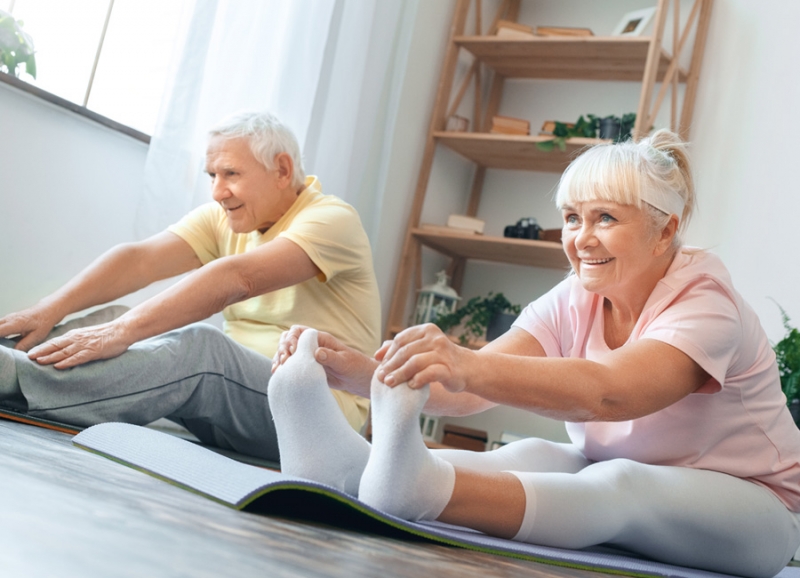No matter your age or activity level, you reap numerous health benefits from spending time in nature. Not only is time spent outdoors good for physical health, it is especially good for brain health. New research from the fields of psychology, health, medicine, and environmental science consistently shows that, for people of all ages, who spend as little as 15 minutes a day interacting with the natural world, experience lower blood pressure, less frequent headaches, and are at lower risk for anxiety and depression. With so much natural beauty surrounding the Everbrook Senior Living Communities, it’s easy to get your daily dose of “nature’s medicine.”
How The Lack of Time Spent in Nature Takes a Toll on Health
Enough research has been done to strongly indicate that people who spend the least amount of time outdoors have greater detriment to their well-being: higher risk of mental health conditions, obesity, high blood pressure, and other chronic illnesses. There’s even a name for the ill-effects of not spending enough time in nature—it’s called “nature-deficit disorder.” Nature deficiency contributes to the following health issues:
- increased stress
- trouble maintaining focus
- diminished emotional resilience
- deficits in self-expression, creative thinking, and reasoning
- difficulty establishing healthy social connections (at work, in the community)
- increased risk for and/or worsening of chronic illness
- loss of connectedness to nature and one's responsibility for protecting it
Even though nature-deficit disorder is not yet regarded as a medical condition, both conventional and holistic health practitioners recognize the significance of the detrimental health effects stemming from lack of contact with nature. In fact, in Canada, doctors can now prescribe national park passes to patients who are at risk for, or who are struggling with depression, anxiety, and certain other mental and physical health conditions. Many more physicians around the world have come to recognize nature-deficit as a nonclinical syndrome that can impair the emotional, cognitive, and physical functioning of adults and children.
The Health Benefits of “Nature’s Medicine”
A variety of scientific studies have looked at nature experiences such as wilderness therapy, backpacking and biking excursions, recreational hiking and camping, time simply sitting in a park or spent working in a garden. These studies have shown remarkable effects on health, particularly for the brain:
Nature’s Effect on Brain Health
Spending time in nature stimulates neural and sensory pathways (the pathways to and from the sense organs and the brain). This helps promote “neuroplasticity,” the process by which the brain forms new, and strengthens existing, neural connections. Additionally, research shows that neural pathways that have been exhausted by stress and the use of technology can be revitalized with regular time spent in nature.
- improved cognitive functioning (focus, attention, problem solving)
- enhanced self-awareness and feelings of peace, relaxation
- reduced anxiety, depression, and cognitive dissonance
- enhanced self-esteem and self-efficacy
- enhanced personal and social relationships
- reduced stress and worry
- enhanced ecological awareness
- enhanced appreciation for the interconnectedness of life and all its creatures
Nature’s Effect on Physical Health
Some of the health benefits of time spent in nature can be noticed immediately while others happen over time, including improved function of the circulatory system, the heart and lungs, and the musculoskeletal system. We also receive an abundance of natural light when we are outdoors, helping to boost the body’s natural production of Vitamin D, which is important for many physical processes, including a healthy immune system.
Get Your Daily Dose of Nature
Whether for 15 minutes or a few hours, there are many ways to experience the health benefits of nature:
Forest Bathing. This is not a dip in a river. It's not a hike with a destined path to follow. Forest bathing or shinrin-yoku, is a Japanese tradition that only dates back to the 1980s! Simply, forest bathing is a meditative immersion in which you slow down and intentionally turn your attention to the smells, textures, tastes, and sights of the forest (or trail, or park, or beach as the case may be).
Observe the Night Sky. Before going to bed in the evening, stand outside (away from artificial light) and gaze at the night sky. Try shifting your awareness from the whole sky to a cluster of stars, to a single star.
Take a Stroll. Leave the fitness tracker at home: This is not a goal-oriented, step-counting walk. Just stroll of as little as 5 minutes up to as long as you desire. As you walk, just breathe and observe. Try not to allow your mind to get caught up in any particular thought sequence. This is meditative walking.
Sit Outside. When was the last time you simply sat in your own backyard or on front porch? Or visited a park near your home or the office? Get there – without the phone – and just be present.
There are so many other outdoor pursuits you can learn (also good for the brain!). From paddleboarding, to taking a plein-aire art class, to joining a conservancy group to help with cleaning the trails – the point is to get outside and give your brain and body a healthy dose of nature’s medicine!
The Wonders of Nature, Just Outside Your Everbrook Front Door
The residents of Everbrook Senior Living Communities need not venture far to enjoy the great outdoors and the health benefits of spending time in nature. Our communities are nestled among tree-lined streets, near local parks and nature preserves, and New England’s finest trails and waterways are never too far. Discover all that Everbrook Senior Living has to offer… just outside your front door:
Colebrook Village - meander the historic villages and towns in and around Hebron, CT.
Stonebrook Village - sit alongside Enfield Falls (CT) or sojourn nearby hiking, biking, and fishing areas.
Elmbrook Village - explore colonial-era history by foot or take to the trails at Hopemeade State Park (CT).
Cedarbrook Village - venture into historic Ware, MA; enjoy the verdant hills, trails, and waterways.
Hillsbrook Village - nestled just outside Concord, NH and near Bear Brook State Park. This community is scheduled to open in Fall 2022.
Resources
National Park Service “Get Outside” Program
National Environmental Education Foundation
Natural Attraction Ecology video
Benefits of Forest Bathing
"Why is nature beneficial?: the role of connectedness to nature." Mayer, F. S., Frantz, C. M., Bruehlman-Senecal E., Dolliver K. Environment and Behavior. 2009; 41(5):607–643. doi: 10.1177/0013916508319745.
"What Is the Best Dose of Nature and Green Exercise for Improving Mental Health? A Multi-Study Analysis." Barton, J., and J. Pretty. Abstract. Environmental Science & Technology 44, no. 10 (May 15, 2010): 3947-3955.
"Green perspectives for public health: a narrative review on the physiological effects of experiencing outdoor nature." Haluza, D., Schanbauer, R., Cervinka, R. International Journal of Environmental Research and Public Health. 2014;11(5):5445–5461. doi: 10.3390/ijerph110505445.
"Examining group walks in nature and multiple aspects of well-being: a large-scale study." Marselle, M. R., Irvine, K. N., Warber, S. L. Ecopsychology. 2014;6(3):134–147. doi: 10.1089/eco.2014.0027
"The restorative benefits of nature: toward an integrative framework." Kaplan, S. Journal of Environmental Psychology. 1995; 15(3):169–182. doi: 10.1016/0272-4944(95)90001-2
"The relationship between nature connectedness and happiness: a meta-analysis." Capaldi, C. A., Dopko, R. L., Zelenski J. M. Frontiers in Psychology. 2014; 5, article 976 doi: 10.3389/fpsyg.2014.00976. [PMC free article] [PubMed]
The Experience of Nature: A Psychological Perspective. (1989) Kaplan, R., Kaplan, S. Cambridge, UK: Cambridge University Press; Republished by Ulrich's, Ann Arbor, Mich, USA, 1995.















